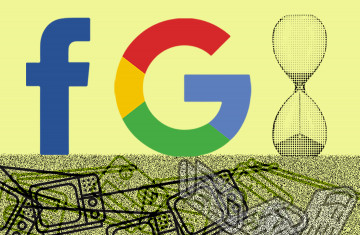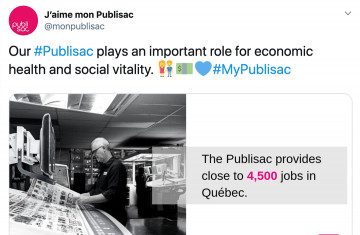Quebec media’s hot topics
Introducing FRIENDS’ new regular columnist, journalist Marie-Ève Martel, who will report on issues regarding the media in Quebec. In her first post of the year, she examines the key topics to watch in the year ahead.

The economic crisis faced by media outlets seems to have reached its peak over the last three years, but only very recently have political authorities begun to understand the importance of supporting these information platforms.
It was one of the commitments set forth in the November 2018 economic update, and later confirmed in the March 2019 budget. The Trudeau government promised a 25 per cent tax credit for journalists, another tax credit for donations to not-for-profit print media outlets, and a 15 per cent tax credit for digital subscriptions to Canadian news media.
Combined, these three tax measures are supposed to represent a total investment of $595 million over five years. However, the three tax breaks announced in support of Canadian print media have yet to be implemented. Could 2020 be the pivotal year for this issue?
During last fall’s election campaign, the Liberal Party of Canada, which formed a minority government after the election in October, promised to apply a 3 per cent tax to GAFAM (the tech giants Google, Apple, Facebook, Amazon and Microsoft) as of April 1, 2020. This contrasted with the Liberals’ stubborn refusal to do that during their first term. Introducing this measure would have brought in $540 million in its first year and $730 million per year as of 2023.
A few days after being sworn into office, the new minister of Canadian Heritage, environmentalist Steven Guilbeault, announced his intention to implement said tax “very quickly.” However, Guilbeault’s zeal was curbed by his leader, Justin Trudeau. A few days later, the Prime Minister declared that it would be preferable to wait for the Organisation for Economic Co-operation and Development (OECD) report on the topic before going forward.
Is this because the U.S. threatened France—the first country to introduce and apply a tech tax—with surtaxes and tariffs? The answer to this question remains hypothetical.
The situation isn’t any better at the provincial level. Quebec Premier François Legault has also stated that he wants to wait for the OECD report, and for Ottawa to take action, before taxing big tech. He made this declaration last December when he was in California. It should be noted that during his trip, Legault visited the offices of Netflix and Google in view of conducting business with these American companies in Quebec.
Moreover, the premier didn’t hide the fact that it would be risky for Quebec to go forward with such measures since the province’s current economic relations with the United States are in great shape.

To avoid the elimination of PubliSacs in communities across Quebec, Transcontinental launched a vast advertising campaign.
In mid-November, Isabelle Melançon, the Liberal MNA for Verdun, tabled Bill 495 in Quebec’s National Assembly. The bill was intended to prohibit municipalities from expelling citizens from public meetings because they do not live in the city where the meeting is taking place, and under the pretext that they take pictures, audio or video recordings of these meetings.
This measure could invalidate about 50 regulations currently in force in Quebec, under which town councils prohibit journalists and/or citizens from filming or recording their meetings. This would ensure that these sessions and this information are open to the public. The issue was not discussed before the end of the parliamentary session in December.
Hung on millions of doorknobs every week in Quebec, PubliSacs—plastic bags filled with flyers, coupons and weekly newspapers—are in danger of disappearing.
Toward the end of 2018, a petition against PubliSacs on environmental grounds garnered thousands of signatures. Signees suggested that the plastic bags should be recyclable and that the dozens of flyers they contain were no longer needed because the participating stores’ discounts can be viewed online.
By introducing a regulation in mid-August, Mirabel became the first municipality in Quebec to ban bagged advertisements. And last fall, Montreal, which banned other single-use plastic bags in 2018, held a public consultation to determine whether PubliSacs should be banned. Many recommended that consumers should have to opt in to receive them instead of getting them automatically.
Complicating the issue is the fact that PubliSacs are the main vehicle for the distribution of dozens of free weekly papers in the province. The owner of PubliSac, Transcontinental, has launched a massive advertising campaign to make its case. Among other arguments, it points out that distributing newspapers by mail would be much more costly and time-consuming, and that thousands of jobs directly or indirectly related to the door-to-door distribution of PubliSacs would be lost.
Hebdos Québec, the non-profit independent press organization whose members use PubliSacs to reach hundreds of thousands of Quebeckers every week, has claimed that banning PubliSacs represents an infringement of freedom of expression and threatens the survival of the regional press.
This didn’t stop the elected members of the Montreal task force from unanimously recommending, at the end of last year, that Montreal switch to an opt-in model. The debate will certainly continue in 2020.
